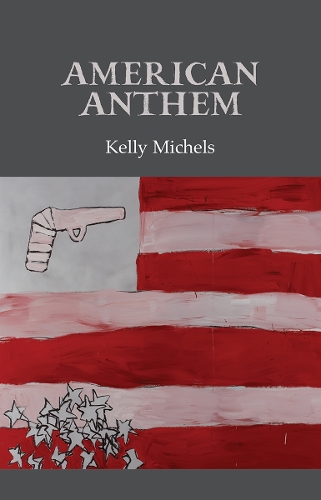American Anthem (Shortlisted, Forward Prizes for Best First Collection)
Kelly Michels
(The Gallery Press, 2024); £11.25, pbk
Sean Scully’s oil and pastel on aluminium depiction of the American flag (‘Ghost Gun’) on the front cover of Kelly Michels’ debut collection, American Anthem, confronts and provokes its reader – the facile drawing of a gun swaddled in blood-tinged bandages in the box-section where the stars usually go, suggests states of anarchy and harm rather than those of unification. Stars that have visibly fallen in a heap like beer caps across impasto-thick white and red stripes, bleeding at their edges, only reinforce this belief. Kelly Michels’ American Anthem has all ‘the whir, the whirl, the hum’ of conflict…not harmony. (‘American Anthem as Here, After’).
The collection is organised into two sections: the first bearing the title of ‘The Quickening’ followed by ‘American Anthem‘, a sort of overture and symphony arrangement that are volubly expressive of the interlinking problems of drug abuse and gun crimes (manifesting in mass shootings) in America today. Michels’ poems present as frank narrations wrapped-up in the language of lyricism—mindful of an iron fist clad in a velvet glove—that hit their reader hard with first-hand renditions of the violence and self-harm relating principally to the narrator’s mother and hometown of Virginia Beach. They have a structural integrity that allows them to be read as standalone poems but when read collectively they possess a greater synergistic power, ceding their often-horrifying contents to adjacent poems through the repetition of sounds, recursive ideas and lines. Michels’ poetry is one of dissonance and consonance – poems that bleed into each other with tragic elegance.
After spending a week sleeping on the floor
of a crack house she comes home dragging
a heap of bones.
(‘Bone Collector’)
‘Hurricane Season in Virginia Beach’ uses enjambment to create fluidity among its stanzas, while occasionally using full stops in the middle of lines to disrupt the flow of sound and idea. Themes recur in what Michels refers to as a ‘trilogy recounting a mass shooting’ in a town known for ‘tourism, evangelism, and the military’ (‘Notes’):
[…] I knew how love
Lived, how it pushed and pulled, how it breathed
In the shape-shifting black holes of their eyes […]
‘Groceries’ features an epigraph by Kierkegaard (Do it or do not do it – you will regret both) and, together with ‘Family Portrait’ and ‘Requiem Under the Flash’, is one of several poems that are mother-focused and relate the devastating effects of the opioid epidemic on community residents.
In the second part of ‘American Anthem’, every alternate poem bears ‘American anthem’ in its title; for example, ‘American Anthem as Word’ and ‘American Anthem as Weight’. The last line of each of the anthems becomes the first line of the next, creating among them a continuity of idea, a brooding threnody. I had a real sense of Michels’ poetry possessing an unassailable threat, a rising tension that is never resolved and Wagner-like in intensity.
The poet’s use of assonance, sibilance and other alliterative devices create wonderful sound effects throughout. Lyrical perspectives offered by the interlinking of anthems through shared lines both inure and repel the reader with eruptions of fear and violence—captured succinctly in the epithet, ‘butterflies on butcher knives’—that have become part of the normal digest of community life.
‘Revising Bosch’s Hell Panel for the 21st Century’ is among the last poems in which Michels depicts Virginia Beach as a kind of Hell, of humanity yoked to an interminable suffering:
They come wearing crowns of gold bullets
in their hair […]
AR-15s in their hands, calling on God to save them.
It goes without saying that this harrowing collection is at times difficult to read, but Kelly Michels’ exquisite aesthetic makes it worthwhile.
William Hume


Leave a Reply